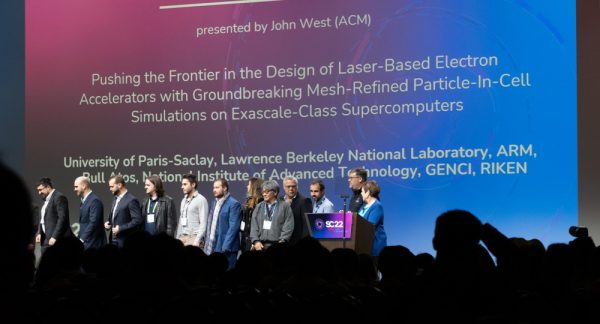At the awards ceremony at SC22 in Dallas today, ACM awarded the 2022 ACM Gordon Bell Prize to a team of researchers who used four major supercomputers – including the exascale Frontier system – to conduct in-depth research on plasma accelerator technologies.
The Gordon Bell Prize is awarded at SC22 each year in celebration of an outstanding achievement in high-performance computing – in particular, the ACM says, to “track the progress over time of parallel computing, with particular emphasis on rewarding innovation in applying high-performance computing to applications in science, engineering and large-scale data analytics.” Six finalists were selected earlier this year ahead of the selection of the winning team, which will receive a $10,000 award courtesy of HPC luminary Gordon Bell.
On Tuesday, the six finalists presented their research to packed rooms, with topics including atomic analysis of metallic materials; analytics for biomedical literature; plasma simulations for laser-based accelerators; geostatistics; earthquake modeling; and protein similarity searches.
Six major systems powered that research. OceanLight, the Chinese exascale system that powered last year’s Gordon Bell Prize-winning research, made another appearance – but this time, it was met by research conducted on the new U.S. exascale system, Oak Ridge National Lab’s Frontier, which debuted this summer. RIKEN’s Fugaku system and Oak Ridge’s Summit system also returned to the list (powering multiple finalist projects), along with NERSC’s Perlmutter system and the Shaheen-2 system at KAUST.
At the end of the day, though, only one of the teams can take home the prize – and when Cherri Pancake, president of ACM, took the stage, the first thing she announced was that the 2022 ACM Gordon Bell Prize was awarded to…
Pushing the Frontier in the Design of Laser-Based Electron Accelerators with Groundbreaking Mesh-Refined Particle-In-Cell Simulations on Exascale-Class Supercomputers

Though the title of the paper – which revolved around kinetic plasma simulations – winks at its use of Frontier, the team actually used four supercomputers: Frontier, Fugaku (RIKEN), Summit and Perlmutter (NERSC), meaning that this one paper used four of the top seven supercomputers on the most recent Top500 list. In an email to HPCwire, Jean-Luc Vay – a senior scientist at Lawrence Berkeley National Lab – outlined the science runs of the research, which were conducted on Frontier (up to 8,192 nodes), Fugaku (up to ~93,000 nodes) and Summit (up to 4,096 nodes).
“Plasma accelerator technologies have the potential to provide particle accelerators that are much more compact than existing ones, opening the door to exciting novel applications in science, industry, security and health,” Vay explained. “Exploiting the most powerful supercomputers in the world to boost the research to make these complex machines a reality is so stimulating to all of us.”
The abstract for the paper is included below. Its authors included Luca Fedeli, Axel Huebl, France Boillod-Cerneux, Thomas Clark, Kevin Gott, Conrad Hillairet, Stephan Jaure, Adrien Leblanc, Rémi Lehe, Andrew Myers, Christelle Piechurski, Mitsuhisa Sato, Neil Zaïm, Weiqun Zhang, Jean-Luc Vay and Henri Vincenti.
Abstract: We present a first-of-kind mesh-refined (MR) massively parallel Particle-In-Cell (PIC) code for kinetic plasma simulations optimized on the Frontier, Fugaku, Summit, and Perlmutter supercomputers. Major innovations, implemented in the WarpX PIC code, include: (i) a three level parallelization strategy that demonstrated performance portability and scaling on millions of A64FX cores and tens of thousands of AMD and Nvidia GPUs (ii) a groundbreaking mesh refinement capability that provides between 1.5x to 4x savings in computing requirements on the science case reported in this paper, (iii) an efficient load balancing strategy between multiple MR levels. The MR PIC code enabled 3D simulations of laser-matter interactions on Frontier, Fugaku, and Summit, which have so far been out of the reach of standard codes. These simulations helped remove a major limitation of compact laser-based electron accelerators, which are promising candidates for next generation high-energy physics experiments and ultra-high dose rate FLASH radiotherapy.
Per the SC22 schedule, this team includes researchers from Arm, Atos, CEA-Université Paris-Saclay, ENSTA Paris, GENCI, Lawrence Berkeley National Lab and RIKEN.
While the plasma accelerator team took home the prize, the other five nominees represent exemplary uses of some of the world’s fastest supercomputers. You can learn lots more about each of the other finalists at this link.
The ACM also awarded its Gordon Bell Special Prize for High Performance Computing-Based Covid-19 Research for the third year running. To learn more about this year’s winner of that prize, click here.




























































